一般过去时句型变化最新版
一般过去时句型变化

05
一般过去时与其他时态的辨析
与现在完成时的区别
时间点不同:现在完成时关注现在,一般过去时关注过去
动作状态不同:现在完成时强调动作对现在的影响,一般过去时描述动作的具体发生和结束时 间
语境适用不同:现在完成时强调与现在的联系,一般过去时适用于描述过去的具体事件
与一般现在时的区别
时间点不同:一般过去时表示过去某个时间点发生的事情,而一般现在时表示现在或 目前正在发生的事情。
语境不同:一般过去时常常用于描述过去的事件、经历或者某个时间点的状态,而一 般现在时则常用于描述当前的状态、习惯或者普遍事实。
表达方式不同:一般过去时需要使用助动词“did”或者动词的过去式,而一般现在 时则直接使用动词原形。
语境:过去进行时通常用于描述某个具体的过去时间点,而一般过去时则用于描述过去的某个 时间段。
与过去完成时的区别
定义:过去完成时表示过去的过去,即某个动作在过去的某个时间之前已经完成 结构:过去完成时由助动词had+过去分词构成 用法:过去完成时用于描述过去的某个动作或状态在另一个过去的动作之前已经发生或完成 例子:I had finished my homework before I went to bed last night
用法不同:一般过去时常常与表示过去的时间状语连用,如 “yesterday”、“last year”等,而一般现在时则常与“now”、 “today”等时间状语连用。
感谢观看
汇报人:XX
XX
一般过去时句型变化
单击添加副标题
汇报人:XX
目录
01
一般过去时句型转换(最新整理)

一般过去时句型转换: 表示过去发生的事情。
is , am→was ;are →were ;do →did ;go→went ;sing →sang;come→came ;have→had1.I was born on February 27th, 1999. 否定句:一般疑问句:特殊疑问句:2.He was born in Bai Lingmiao. 否定句:一般疑问句:特殊疑问句:3.It was rainy yesterday. 否定句:一般疑问句:特殊疑问句:反义疑问句:选择疑问句:(windy)4. These were their books. 否定句:一般疑问句:特殊疑问句:5.I did my homework yesterday. 否定句:一般疑问句:特殊疑问句:6. He went to the park last week. 否定句:一般疑问句:特殊疑问句:反义疑问句:选择疑问句:(the shop)7. She sang some English songs at home last night.否定句:一般疑问句:特殊疑问句:8.Linda went to school on foot yesterday morning.否定句:一般疑问句:特殊疑问句:反义疑问句:选择疑问句:(by bike)9.They lived in a big house 10 years ago. 否定句:一般疑问句:特殊疑问句:10.The twins liked swimming last year. 否定句:一般疑问句:特殊疑问句:反义疑问句:选择疑问句:(running)11.There used to be lots of flowers in the garden years ago.否定句:一般疑问句:特殊疑问句:“”“”At the end, Xiao Bian gives you a passage. Minand once said, "people who learn to learn are very happy people.". In every wonderful life, learning is an eternal theme. As a professional clerical and teaching position, I understand the importance of continuous learning, "life is diligent, nothing can be gained", only continuous learning can achieve better self. Only by constantly learning and mastering the latest relevant knowledge, can employees from all walks of life keep up with the pace of enterprise development and innovate to meet the needs of the market. This document is also edited by my studio professionals, there may be errors in the document, if there are errors, please correct, thank you!。
一般过去时的句子结构

一般过去时的句子结构1、be动词的一般过去时其句型:肯定式:主语+BE动词过去式(was、were)+其他 e.g.I was very happy last night.否定式:主语+BE动词过去式(was、were)+not+其他 e.g.Mike wasn’t at home yesterday. 疑问式:BE动词过去式(was、were)+主语+其他 e.g.Was he a driver three years ago?2、当谓语由实义动词充当(不区分第三人称单数):肯定式:主语+动词过去式+其它 e.g.I played the piano yesterday evening.否定式为:主语+did not+动词原形+其它 e.g.He didn’t go to the cinema last night.疑问式为:Did+主语+动词原形+其它 e.g.Did she teach you English yesterday?一般过去时的句子结构1、be动词的一般过去时其句型:肯定式:主语+BE动词过去式(was、were)+其他 e.g.I was very happy last night.否定式:主语+BE动词过去式(was、were)+not+其他 e.g.Mike wasn’t at home yesterday. 疑问式:BE动词过去式(was、were)+主语+其他 e.g.Was he a driver three years ago?2、当谓语由实义动词充当(不区分第三人称单数):肯定式:主语+动词过去式+其它 e.g.I played the piano yesterday evening.否定式为:主语+did not+动词原形+其它 e.g.He didn’t go to the cinema last night.疑问式为:Did+主语+动词原形+其它 e.g.Did she teach you English yesterday?一般过去时的句子结构1、be动词的一般过去时其句型:肯定式:主语+BE动词过去式(was、were)+其他 e.g.I was very happy last night.否定式:主语+BE动词过去式(was、were)+not+其他 e.g.Mike wasn’t at home yesterday. 疑问式:BE动词过去式(was、were)+主语+其他 e.g.Was he a driver three years ago?2、当谓语由实义动词充当(不区分第三人称单数):肯定式:主语+动词过去式+其它 e.g.I played the piano yesterday evening.否定式为:主语+did not+动词原形+其它 e.g.He didn’t go to the cinema last night.疑问式为:Did+主语+动词原形+其它 e.g.Did she teach you English yesterday?。
一般过去时态句型转换方法归纳
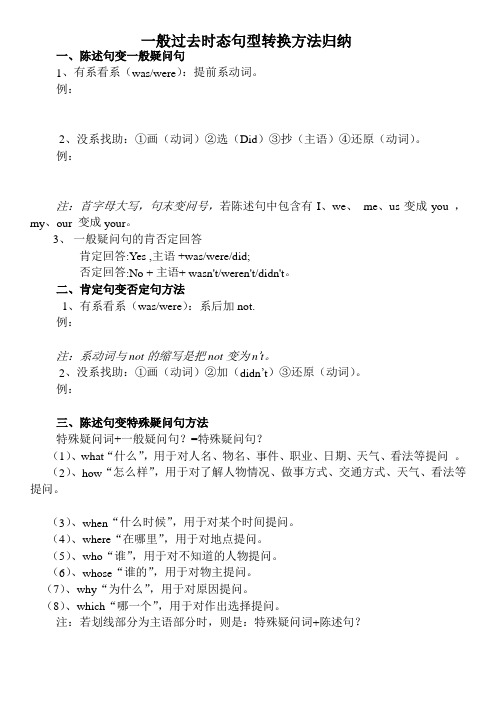
一般过去时态句型转换方法归纳
一、陈述句变一般疑问句
1、有系看系(was/were):提前系动词。
例:
2、没系找助:①画(动词)②选(Did)③抄(主语)④还原(动词)。
例:
注:首字母大写,句末变问号,若陈述句中包含有I、we、me、us变成you ,my、our 变成your。
3、一般疑问句的肯否定回答
肯定回答:Yes ,主语 +was/were/did;
否定回答:No + 主语+ wasn't/weren't/didn't。
二、肯定句变否定句方法
1、有系看系(was/were):系后加not.
例:
注:系动词与not的缩写是把not变为n’t。
2、没系找助:①画(动词)②加(didn’t)③还原(动词)。
例:
三、陈述句变特殊疑问句方法
特殊疑问词+一般疑问句?=特殊疑问句?
(1)、what“什么”,用于对人名、物名、事件、职业、日期、天气、看法等提问。
(2)、how“怎么样”,用于对了解人物情况、做事方式、交通方式、天气、看法等提问。
(3)、when“什么时候”,用于对某个时间提问。
(4)、where“在哪里”,用于对地点提问。
(5)、who“谁”,用于对不知道的人物提问。
(6)、whose“谁的”,用于对物主提问。
(7)、why“为什么”,用于对原因提问。
(8)、which“哪一个”,用于对作出选择提问。
注:若划线部分为主语部分时,则是:特殊疑问词+陈述句?。
一般过去时的四种句型

一般过去时的四种句型
肯定形式:主语+动词过去式+其它。
否定形态:主语+didnt+谓语动词原形+其它。
一般疑问句:Did+主语+谓语动词原形+其它?Was/Were+主语+表语?被动语态:主语+was/were+动词的过去分词。
扩展资料
一般过去时句子结构
1、在表示某个时间里存在的状态的句子,系动词用过式was,were构成。
2、在表示过去某个时间里发生的动作,用动词的'过去式构成。
3、各种句式
(1)一般过去时的肯定陈述句:
主语+动词过去式+宾语或表语。
(2)一般过去时的否定句:
a.主语+didn’t+动词原形+宾语。
(did+not=didn't)
b.主语+wasn’t/weren’t+表语。
(was+not=wasn't,were+not=weren't)
(3)一般过去时的一般疑问句:
a.Did+主语+动词原形+宾语?
b.Was/Were+主语+表语?
(4)一般过去时的特殊疑问句:
a.特殊疑问词+did+主语+动词原形+宾语?
b.特殊疑问词+were/was+表语?
向你推荐的相关文章
相关文章列表
微信扫码分享。
超详细一般过去时的全面讲解【附练习与答案】
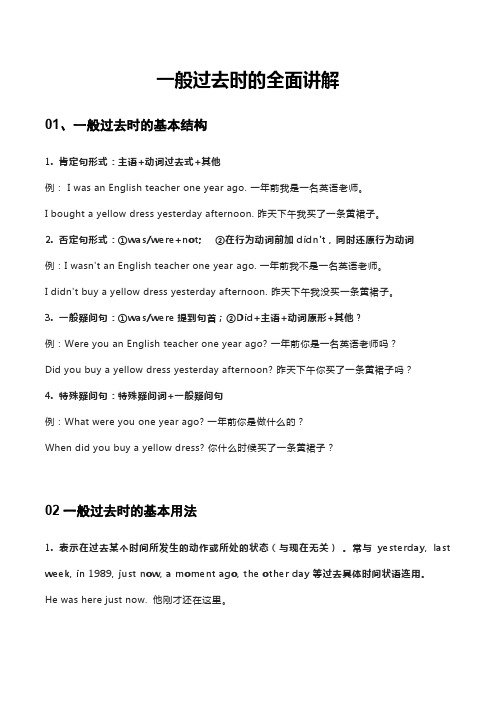
一般过去时的全面讲解01、一般过去时的基本结构1. 肯定句形式:主语+动词过去式+其他例: I was an English teacher one year ago. 一年前我是一名英语老师。
I bought a yellow dress yesterday afternoon. 昨天下午我买了一条黄裙子。
2. 否定句形式:①was/were+not; ②在行为动词前加didn't,同时还原行为动词例:I wasn't an English teacher one year ago. 一年前我不是一名英语老师。
I didn't buy a yellow dress yesterday afternoon. 昨天下午我没买一条黄裙子。
3. 一般疑问句:①was/were提到句首;②Did+主语+动词原形+其他?例:Were you an English teacher one year ago? 一年前你是一名英语老师吗?Did you buy a yellow dress yesterday afternoon? 昨天下午你买了一条黄裙子吗?4. 特殊疑问句:特殊疑问词+一般疑问句例:What were you one year ago? 一年前你是做什么的?When did you buy a yellow dress? 你什么时候买了一条黄裙子?02一般过去时的基本用法1. 表示在过去某个时间所发生的动作或所处的状态(与现在无关)。
常与yesterday, last week, in 1989, just now, a moment ago, the other day等过去具体时间状语连用。
He was here just now. 他刚才还在这里。
What did you do yesterday? 你昨天做了什么事?2. 在过去一段时间内的经常性或习惯性动作。
一般过去时句型变化
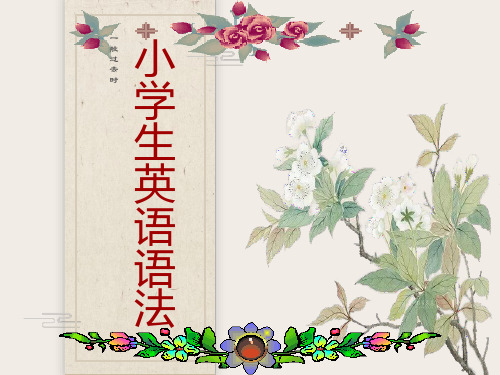
Was/Were+主语 + 其它?
Yes, he was. No, he wasn't.
Yes, they were. No, they weren't.
按要求改写句子
1)Lucy was tired yesterday. 疑问句:______________________________ 肯定回答: . 否定回答:____________________________.
study studied carry carried
look looked play played start started
Were they at the hospital?
Yes, she was.
No, she wasn't.
Yes, they were.
No, they weren't.
否定句:He didn't go to the hospital yesterday.
He went to the hospital yesterday.
否定句:They didn't have a party last Saturday. 含有 行为 动词的句型 表示过去某个时间发生的动作或存在的状态 主语 + did not (didn't)+ 动词原形+其它
They had a party last Saturday.
一般过去时
按要求改写句子
3)末尾只有一个辅音字母的 重读闭音节词,先双写这 个辅音字母,再加—ed
stop stopped plan planned trip tripped
(完整word版)一般过去时详解(重点)

一、一般过去时的概念:一般过去时用来表示过去某一时间内发生的动作或存在的状态以及过去习惯性、反复性的动作。
谓语动词要用动词的过去式,常和表示过去的时间状语连用,如yesterday昨天、last night昨晚、last week上周、last year去年,等。
二、一般过去时的结构:(可分三类不同的结构)1.Be动词的一般过去时在没有实义动词的句子中使用be动词, am is 的过去式为was; are的过去式为were肯定句式:主语 + be(was , were) + 其它.否定句式:主语 + be(was , were) + not + 其它.一般疑问句:Be(was , were) + 主语 + 其它?注:在这种构成中,be动词有人称和数的变化,即要根据主语选用was / were。
Be动词分为单数和复数,was是表示单数,were是表示复数。
2. 实义动词的一般过去时态肯定句要使用动词的过去式,否定句和疑问句要使用助动词do和 does 的过去式 did.肯定句式:主语 + 动词(过去式)+ 其它否定句式:主语 + didn’t + 动词(原形)+ 其它【did not = didn’t】一般疑问句:Did + 主语+ 动词(原形)+ 其它【do , does的过去时均为did】?注:did和didn’t是构成一般过去时的助动词,其特点是要在其后跟动词的原形。
3. 情态动词的一般过去时态含有情态动词的一般过去时与含有Be动词的一般过去时,是十分相似,请注意观察。
肯定句式:主语 + 情态动词 + 其它.否定句式:主语 + 情态动词 + not + 其它.一般疑问句:情态动词 + 主语 + 其它?注:情态动词的过去式:can→could , may→might , must→must,will-would,should-should.4.特殊疑问句式:特殊疑问词+be过去式+主语+其他?特殊疑问词+情态助动词过去式+主语+动词原形+其他?特殊疑问词+do/does过去式+主语+动词原形+其他?What was your former name?你以前叫什么名字?Why did he late for school last Monday?上星期一他为什么迟到?What could she do twenty years ago?20年前她能做什么?三、一般过去时的判断标志词yesterday , the day before yesterday , last + 时间 , this morning时间 + ago , just now , a moment ago , in + 过去的时间 .四、规则动词的过去式1.一般情况下,在动词原形后面加-ed。
一般过去时的用法和表示方式

一般过去时的用法和表示方式一般过去时是英语中最常用的过去时态,用来表示已经发生或完成的动作、事件或状态。
本文将详细介绍一般过去时的用法和表示方式。
I. 一般过去时的定义一般过去时用于描述过去某个特定时间发生的动作或状态。
它与现在无关,强调的是过去的事实或经历。
II. 一般过去时的构成一般过去时的肯定句句式为:主语 + 动词过去式 + 其他成分。
例如:1. I went to the store yesterday.2. She played soccer with her friends last weekend.3. They studied English for three hours yesterday.否定句句式为:主语 + did not/didn't + 动词原形 + 其他成分。
例如:1. I didn't go to the store yesterday.2. She didn't play soccer with her friends last weekend.3. They didn't study English for three hours yesterday.疑问句句式为:Did + 主语 + 动词原形 + 其他成分?例如:1. Did you go to the store yesterday?2. Did she play soccer with her friends last weekend?3. Did they study English for three hours yesterday?III. 一般过去时的表示方式1. 定时或时间状语词一般过去时中常常与表示过去时间的词语或短语一起使用,如yesterday(昨天)、last night(昨晚)、in 1999(在1999年)等。
这些时间状语词能够帮助准确表达动作或事件发生的具体时间。
(完整版)一般过去时时用法及例句
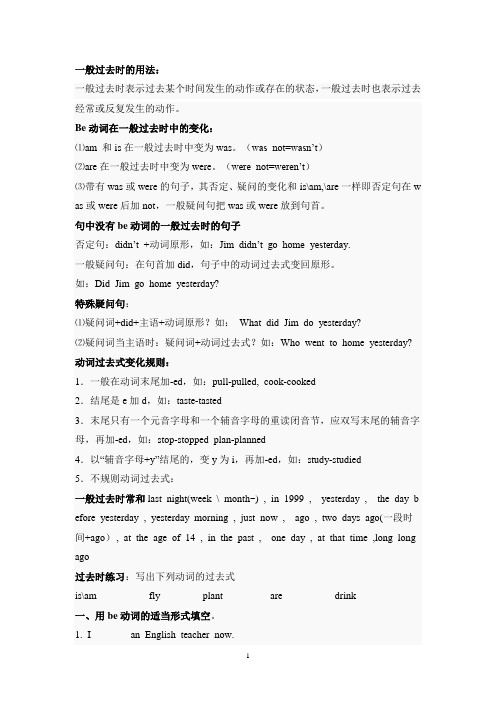
一般过去时的用法:一般过去时表示过去某个时间发生的动作或存在的状态,一般过去时也表示过去经常或反复发生的动作。
Be动词在一般过去时中的变化:⑴am 和is在一般过去时中变为was。
(was not=wasn’t)⑵are在一般过去时中变为were。
(were not=weren’t)⑶带有was或were的句子,其否定、疑问的变化和is\am,\are一样即否定句在w as或were后加not,一般疑问句把was或were放到句首。
句中没有be动词的一般过去时的句子否定句:didn’t +动词原形,如:Jim didn’t go home yesterday.一般疑问句:在句首加did,句子中的动词过去式变回原形。
如:Did Jim go home yesterday?特殊疑问句:⑴疑问词+did+主语+动词原形?如:What did Jim do yesterday?⑵疑问词当主语时:疑问词+动词过去式?如:Who went to home yesterday? 动词过去式变化规则:1.一般在动词末尾加-ed,如:pull-pulled, cook-cooked2.结尾是e加d,如:taste-tasted3.末尾只有一个元音字母和一个辅音字母的重读闭音节,应双写末尾的辅音字母,再加-ed,如:stop-stopped plan-planned4.以“辅音字母+y”结尾的,变y为i,再加-ed,如:study-studied5.不规则动词过去式:一般过去时常和last night(week \ month~) , in 1999 , yesterday , the day b efore yesterday , yesterday morning , just now , ago , two days ago(一段时间+ago), at the age of 14 , in the past , one day , at that time ,long long ago过去时练习:写出下列动词的过去式is\am_________ fly_______ plant________ are ________ drink___一、用be动词的适当形式填空。
一般过去时的规则与常见句型解析

一般过去时的规则与常见句型解析一般过去时是英语中最常用的过去时态之一,用来表达在过去某个具体时间或一段时间内发生的动作或存在的状态。
本文将解析一般过去时的规则和常见句型,帮助读者正确运用该时态。
一、一般过去时的规则1. 动词规则变化:一般过去时的动词大部分采用动词过去式的形式,一般是在动词原形后加上-ed。
例如:work → worked, visit → visited.还有一些特殊情况,如:a. 以辅音字母+y结尾的动词,变为过去式时,将y变为i再加-ed。
例如:study → studied.b. 以“辅音字母+元音字母+辅音字母”结尾的重读闭音节动词,且末尾只有一个辅音字母时,先双写该辅音字母,再加-ed。
例如:stop→ stopped.c. 以“-e”结尾的动词,在结尾加上-d。
例如:live → lived.d. 一些不规则动词,变为过去式时需根据规则记忆。
例如:go → went, have → had.2. 句子结构:一般过去时的肯定句由主语 + 动词的过去式 + 其他成分构成。
例如:She played basketball last night.否定句由主语 + 动词的过去式 + not + 其他成分构成。
例如:He did not go to the party.疑问句由动词did + 主语 + 动词原形 + 其他成分构成。
例如:Did you finish your homework?二、一般过去时的常见句型1. 表示过去经常性的动作:常用的句型有"used to + 动词原形"和"would + 动词原形"。
例如:a. We used to go swimming every Sunday.b. He would often take a walk after dinner.2. 表示过去同时或相继发生的动作:常用的句型有"When + 一般过去时,一般过去时"和"While + 一般过去时,一般过去时"。
六年级一般过去时句型变换
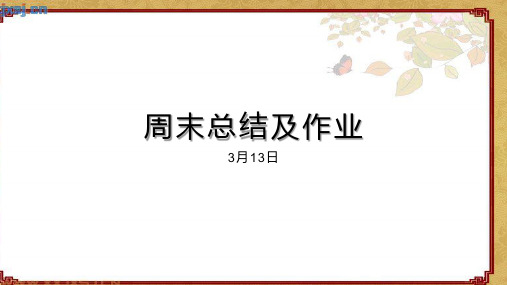
我上周末没看电视。
三、 一般疑问句“Did+主语+动词原形+其他 I watched TV last night.(变为一般疑问句) ----Did you watch TV last night?
肯定回答为 Yes,主语+did,否定回答为“No, 主语+didn't,
如:Yes,I did. / No,I didn't
2、He saw a film yesterday.(变为否定句) He didn't ssaewe a film yesterday
3、I played football this morning. (变为一般疑问句 ,并作肯定回答) Did you I played football this morning ?
周末总结及作业
3月13日
学过的不规则动词过去式
am is--was are--were do--did have has--had
是
是
助动词
有、吃
go--went read--read hurt--hurt can--cound
去
读
弄伤
能
see--saw drink--drank sleep--slept fall--fell
四、特殊疑问句:特殊疑问词+一 般疑问句? What did you do last weekend?
When did you watch TV?
Where did you go last weekend?
How did you go to school?
句型转换
1、Mary does her homework everyday. (用last night改写句子)。 Mary did her homework last night
英语一般过去时笔记

英语一般过去时笔记一、一般过去时的概念。
一般过去时表示过去某个时间发生的动作或存在的状态,也可表示过去经常或反复发生的动作。
常和表示过去的时间状语连用,如yesterday(昨天),last week (上周),three days ago(三天前),in 1990(在1990年)等。
二、一般过去时的构成。
1. be动词的一般过去时。
- am和is的过去式是was,are的过去式是were。
- 肯定句:主语 + was/were+其他。
例如:I was at home yesterday.(我昨天在家。
)- 否定句:主语+ was/were + not+其他。
例如:He was not at school last week.(他上周不在学校。
)- 一般疑问句:Was/Were+主语+其他? 例如:Were you at the park yesterday?(你昨天在公园吗?)- 特殊疑问句:特殊疑问词+ was/were+主语+其他? 例如:Where were you last night?(你昨晚在哪里?)2. 实义动词的一般过去时。
- 规则动词的过去式。
- 一般在动词原形末尾加 - ed。
如:play - played,look - looked。
- 以不发音的e结尾的动词加 - d。
如:live - lived,hope - hoped。
- 末尾只有一个辅音字母的重读闭音节动词,先双写这个辅音字母,再加 - ed。
如:stop - stopped,plan - planned。
- 以“辅音字母+y”结尾的动词,变y为i,再加 - ed。
如:study - studied,carry - carried。
- 不规则动词的过去式(需要特殊记忆,如go - went,have - had,do - did 等)- 肯定句:主语+动词的过去式+其他。
例如:He played football yesterday.(他昨天踢足球了。
一般过去时规则变化规律

一般过去时规则变化规律1. 引言一般过去时,听起来好像有点难,但其实掌握了基本规则,就能轻松搞定。
我们今天就来聊聊这个话题,顺便了解一下它的变化规律。
说起来,这个时间的使用其实还蛮有趣的呢!2. 一般过去时的基本规则2.1. 规则动词一般过去时的规则动词变化其实很简单,只要记住一个小诀窍就好了。
动词加上ed就行了。
例如:play变成played,比如:“我昨天玩了篮球。
”talk变成talked,比如:“她上周和我聊了很多。
”这个规则很简单,是不是很有用呢?当然了,偶尔也会有些例外,比如动词以e结尾的,只需要加d。
例如:love变成loved,例如:“他们去年爱上了这部电影。
”2.2. 不规则动词不规则动词就有点复杂啦!这类动词的过去式要特别记忆,因为它们的变化并不按照规律来。
例如:go变成went,比如:“我们上个月去了海边。
”eat变成ate,例如:“昨天我吃了一个大汉堡。
”这些不规则动词就像是过去的老朋友,虽然他们不按常规出牌,但用久了,你就会熟悉它们了。
3. 一般过去时的实际运用3.1. 讲述过去的故事当我们讲述过去的事情时,一般过去时总是能帮我们把故事讲得更清楚。
例如:“去年夏天,我和朋友们去了一趟旅行,那个时候我们真的很开心。
”用一般过去时,我们可以把事情的发生顺序、时间点都表达得非常明确,这样别人听了也能很清楚地了解你的故事。
3.2. 习惯用法一般过去时不仅仅用来讲述具体事件,还能描述过去的习惯。
例如:“小时候,我每天都要吃妈妈做的早餐。
”这个用法很能勾起人们的回忆,仿佛带我们穿越到那个熟悉的年代。
你说是不是呢?4. 结语总的来说,一般过去时虽然规则很简单,但有些细节和不规则动词可能让人有些头疼。
不过,只要我们用心去记忆和练习,掌握它还是非常容易的。
无论是讲故事还是回忆往事,一般过去时都会是你最得力的助手。
希望今天的分享对你有帮助,快去试试吧!。
一般过去时句型

一般过去时句型
一般过去时是英语中表示过去发生的动作或状态的一种时态。
以下是一些常见的一般过去时的句型:
1. 肯定句:主语 + 动词过去式(例如:I walked to school yesterday.)
2. 否定句:主语 + did not (didn't) + 动词原形(例如:She didn't go to the party last night.)
3. 疑问句:Did + 主语 + 动词原形?(例如:Did you watch the movie last night?)
4. 特殊疑问句:特殊疑问词 + did + 主语 + 动词原形?(例如:What did you do yesterday?)
5. 简单过去时的时间状语:yesterday, last week, in 2010等(例如:I went to Paris last year.)
6. 简单过去时的被动语态:was/were + 动词的过去分词 (例如:The book was written by Mark Twain.)
7. 简单过去时的完成时态:had + 动词的过去分词 (例如:He had finished his homework before dinner.)
8. 简单过去时的进行时态:was/were + 现在分词 (例如:They were watching TV when
I arrived.)。
一般过去时的句子

一般过去时的句子一般过去时是英语中最基本的时态之一,用来描述过去发生的事情、习惯或状态。
在一般过去时的句子中,动词通常要加上-ed 结尾,但也有一些不规则动词需要特别记忆。
下面我们来详细了解一般过去时的句子结构和用法。
一般过去时的肯定句结构是,主语 + 动词过去式 + 其他。
例如:I watched a movie yesterday.(昨天我看了一部电影。
)。
She played basketball last week.(她上周打篮球。
)。
在一般过去时的句子中,动词过去式的变化规则是:一般情况下,在动词原形后加-ed。
例如,watched, played。
以不发音的e结尾的动词,只加-d。
例如,liked, danced。
以辅音字母+y结尾的动词,变y为i再加-ed。
例如,studied, tried。
另外,一般过去时也有一些不规则动词,它们的过去式需要特别记忆,比如:go的过去式是went。
eat的过去式是ate。
have的过去式是had。
一般过去时的否定句结构是,主语 + did not + 动词原形 +其他。
例如:I did not watch a movie yesterday.(昨天我没有看电影。
)。
She did not play basketball last week.(她上周没有打篮球。
)。
一般过去时的疑问句结构是,Did + 主语 + 动词原形 + 其他?例如:Did you watch a movie yesterday?(昨天你看了电影吗?)。
Did she play basketball last week?(她上周打篮球了吗?)。
在一般过去时的句子中,我们还需要注意一些时间状语的使用,比如yesterday(昨天)、last week(上周)、two days ago(两天前)等,它们可以帮助我们更清楚地表达动作发生的时间。
另外,一般过去时也可以用来描述过去的习惯或状态,比如:She used to play the piano when she was young.(她年轻的时候常常弹钢琴。
一般过去时全文

3.一般疑问句:Be动词 / Did+主语+动词原形+其 他?
如:Were you in school last Friday? Did your mother cook dinner last night? Did you wash your clothes last Sunday?
4.特殊疑问句:特殊疑问词+一般疑问句? 如:I was at home yesterday. → Where were you yesterday?
2. 用所给动词的适当形式填空。 (1)Did you _p_l_a_y_ (play) the piano yesterday? (2)I _w_r_o_t_e (write) a letter last night. (3)Who _c_l_e_a_n_e_d_ (clean) the window yesterday? (4)Sarah__ra_n__ (run) to school this morning. (5)Tom _w_e_n_t_ (go) to the park last Sunday.
1. It
(be) Mary's birthday last Friday.
2. We all
(have) a good time last night.
解析:本题考查动词的过去式。1,2小题中的时间词
last Friday 和last night 都2. had
3. meet _m_e_t__ 6. teach _ta_u_g_h_t 9. fly _f_le_w__ 12. drive _d_r_o_v_e 15. tell _t_o_l_d_
二、用括号内所给动词的适当形式填空。 1. Tom and Mary _c_a_m_e_(come) to China last month. 2. Mary _r_e_a_d_(read) English yesterday morning. 3. There _w_e_r_e_(be) no children here ten minutes ago. 4. What __d_id__ you __d_o__ the day before yesterday?(do) 5. Last week wep_i_c_ke_d_(pick) many apples on the farm.
一般过去时知识点梳理总结

一般过去时知识点梳理总结一、一般过去时含义:表示动作发生在过去二、一般过去时的时间标志词:yesterday(昨天)、the day before yesterday(前天)、just now(刚刚)、this morning(今天早上)、in 2002(在2002年) ...ago(...之前):three days ago(三天前)、two weeks ago(两年前) last...(上一个...):last week(上一周),last month(上个月)in the past(在过去)三、一般过去时的句型:1.be动词(am的过去式:was;is的过去式:was are的过去式:were)1)肯定句:主语+be动词过去式...如:He was a teacher.他以前是一个老师。
They were teachers.他们以前是老师。
2)否定句:主语+be动词过去式+not...如:He wasn’t a teacher..他以前不是一个老师。
They weren’t teachers.他们以前不是老师。
3)一般疑问句:be动词过去式+主语...如:Was he a teacher?他以前是一个老师吗?Were they teachers?他们以前是老师吗?肯定回答:Yes,主语+be动词过去式。
如:Yes,he was.Yes,they were.否定回答:No,主语+be动词过去式+not.如:No,he wasn’t.No,they weren’t.3)特殊疑问句:特殊疑问词+be动词过去式+主语...如:What was he?他以前是干什么的?What were they?他们以前是干什么的?2.实义动词实义动词的否定句、疑问句需要借助助动词,(助动词do/does的过去式是did)1)肯定句:主语+动词过去式...如:I went to school yesterday.我昨天去学校了。
一般过去时的基本结构句型

一般过去时的基本结构句型
1. 他昨天跑得像火箭发射似的,一下就没影了。
2. 我前天吃的饭多得像小山一样,肚子差点撑破。
3. 那只猫刚才跳得仿佛能跳到月亮上去。
4. 她上周笑起来像个开了闸的洪水,根本停不下来。
5. 小明昨天说话快得像机关枪扫射,都听不清内容。
6. 小红上个学期读书认真得像要把书吃进肚子里。
7. 爷爷去年讲故事讲得像个超级播音员,绘声绘色的。
8. 奶奶从前做菜香得像有魔法一样,能把人魂儿勾走。
9. 弟弟刚刚哭得像个大喇叭,声音震天响。
10. 姐姐前天打扮得像个仙女下凡,美极了。
11. 那家伙昨天愤怒得像头要喷火的恐龙。
12. 我昨天看到的蛇长得像火车一样长,吓死人了。
13. 他以前睡觉沉得像块大石头,打雷都不醒。
14. 老王昨天钓鱼多的像把整个池塘的鱼都钓上来了。
15. 小李上次唱歌难听的像乌鸦叫,让人想捂耳朵。
16. 小赵昨天写字乱得像龙卷风席卷过一样。
17. 那小孩昨天玩得像个小疯子,到处乱窜。
18. 她昨天穿得像个彩色的气球,花花绿绿的。
- 1、下载文档前请自行甄别文档内容的完整性,平台不提供额外的编辑、内容补充、找答案等附加服务。
- 2、"仅部分预览"的文档,不可在线预览部分如存在完整性等问题,可反馈申请退款(可完整预览的文档不适用该条件!)。
- 3、如文档侵犯您的权益,请联系客服反馈,我们会尽快为您处理(人工客服工作时间:9:00-18:30)。
7)Tom _s_a_w__(see) the nurse yesterday. 8)Lily _d_r_a_n_k(drink) orange juice just now. 9)The doctor _g_a_v__e(give) her some medicine yesterday. 10)Tom a_t_e___(eat) meat ye.sterday afternoon.
1)Tom ate meat just now .
疑问句:__D_id__T_om__e_a_t _m_e_at_j_u_st_n_o_w_?__d.
.
否定回答:_N_o_,_h_e_d_i_dn_'_t.__________________.
2) Lucy had a bad dream.
d
.
一般过去时
表示过去某个时间发生的动作或存在的状态
含有 be 动词的句型
I was a teacher last year. She(He) was a singer. We You were happy. They
.
一般过去时
表示过去某个时间发生的动作或存在的状态
含有 be 动词的句型
1. He was a teacher last year. 否定句:He was not a teacher last year. 2. They were happy just now. 否定句:They were not happy now.
主语 + wasn’t/weren’t + 其 它.
按要求改写句子
1)Lucy was tired yesterday.
否定句: Lucy wasn't tired yesterd__a__y__.______
.
2) You were a doctor last year.
否定句: You weren't a doctor last year.
含有 行为 动词的句型
1. He went to the hospital yesterday. 否定句:He didn't go to the hospital
yesterday. 2. They had a party last Saturday.
否S定a主t句u语r:da+Tyh.deiyddnidont其't(d.h它iadvne'ta)+pa动rty词la原st形+
.
.
一般过去时
表示过去某个时间发生的动作或存在的状态
含有 be 动词的句型
1. He was a teacher last year. Yes, he was. 疑问句:Was he a teacher last year?No, he wasn't. 2. They were happy just now. Yes, they were. 疑问句:Were they happy now? No, they weren't
疑问句: Did Lucy have a bad dream? 肯定回答:Yes, she did. __________N_o_,_sh_e_d_id_n_'t_. _________.
否定回答:
.
按要求改写句子
1) Lucy did her homework at home yesterday.
按要求改写句子
1)I ate meat just now .
否定句: I didn't eat meat just now .____________
.
2) I had a bad dream.
否定句: I didn't have a bad dream.
.
.
一般过去时
表示过去某个时间发生的动作或存在的状态
Was/Were+. 主语 + 其它?
按要求改写句子
1)Lucy was tired yesterday.
疑问句:__W_a_s_L_u_c_y_ti_r_ed__ye_s_te_r_d_ay_?___________
肯定回答: Yes, she was.
.
否定回答:_N_o_,_s_h_e_w_a_s_n'_t._________________.
含有 行为 动词的句型
1. He went to the hospital yesterday. 疑问句:Did he go to the hospital yesterday? 肯定回答:Yes, he did. 否定回答: No,he didn't.
Did+主语 + 动词原形+其它? .
按要求改写句子
2) They were at the hospital.
疑问句: Were they at the hospital?
.
肯定回答: Yes, they were.
.
否定回答:_N_o_, _th_e_y _w_e_re_n_'t._________________.
.
一般过去时
表示过去某个时间发生的动作或存在的状态
2. 用动词的适当形式填空
11) They _li_v_e_d__ (live) here two years ago.
12) He _____ (study)English here last year.
13)My fsathuedriepdlayed(play) with me just now. 14) Hes_to__p_p_ed (stop) here a moment ago. 15) Lucy l_o_o_k_e_ (look) at the picture just now.
2. 用动词的适当形式填空
1) He _w_a__s__ here yesterday. (be)
2) I __g_o_t_ up at 6:00 yesterday morning.(get) 3) My father went often to work by bus last year.(go) 4) I ___w_a_(sbe) ill last Sunday. 5) We _h_a__d_ (have) a party last Saturday.
